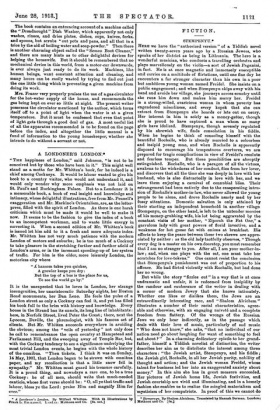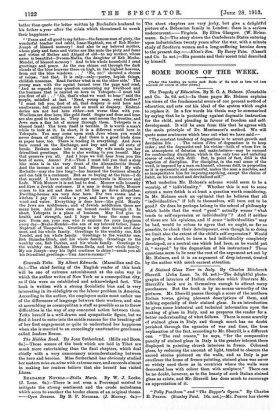FICTION.
STEMPENYT.T.* HERE we have the "authorized version " of a Yiddish novel written twenty-seven years ago by a Russian Jewess, who speaks of her district as being in Lithuania. The hero is a wonderful musician, who conducts a travelling orchestra and plays marvellously on the violin—a sort of Jewish Paganini, in fact. He is at once magnetic and immensely susceptible and carries on a multitude of flirtations, until one fine day he encounters a far stronger character than his own in a poor but ambitious young woman named Freidel. She insists on a public engagement ; and when Stempenyu skips away with his band and avoids her village, she journeys across country until she runs him down and makes him marry her. Freidel is a strong-willed, avaricious woman in whom poverty has engendered miserliness, and every kopek that she can extract from Stempenyu she hoards or lets out on usury. Her interest in him is solely as a money-getter, though she is proud to have captured a man whom so many girls have idolized. Stempenyu, though severely regulated by his shrewish wife, finds consolation in his fiddle. When he begins to think of consoling himself with the beautiful Rochalle, who is already married to a colourless and insipid young man, and when Rochelle is apparently disposed to encourage his tempestuous overtures, we are prepared for tragic complications in view of Freidel's resolute and fearless temper. But these possibilities are abruptly extinguished. Rochalle, who is a paragon of all the virtues, awakens to the wickedness of her conduct, flies from her lover, and discovers that all the time she was deeply in love with her husband, who is also distractedly in love with her, and we leave them enjoying a carnival of connubial bliss. Their estrangement had been entirely due to the exasperating intru- sion of Rochalle's mother-in-law, who never allowed the young people to be alone, and drove Rochalle nearly mad by her fussy attentions. Domestic salvation is only attained by their starting an independent household in another village Stempenyu, on the other hand, is left to the untender mercies of his money-grubbing wife, his lot being aggravated by the constant visits of her mother, " Ziporah the Fat One," a garrulous lady with great powers of florid invective, and a weakness for hot goose fat with onions at breakfast. His efforts to keep the peace between these two shrews are appre- ciated by neither : as the old lady tactfully observes, " Though every dog is a master on his own doorstep, you must remember that I am no stranger to you. After all, I am your mother-in- law ; and, when one plays with the cat, one must take her scratches for love-tokens." One cannot resist the conclusion that Stempenyu's punishment was out of proportion to his offence. He had flirted violently with Rochalle, but bad done her no wrong.
But while the story "fizzles out" in a way that is at once undramatic and unfair, it is redeemed from insipidity by the candour and exuberance of the writer in dealing with a corner of modern Jewry that she knows intimately. Whether one likes or dislikes them, the Jews are an extraordinarily interesting race, and " Shalom Aleichem " illustrates a number of their racial characteristics, agree- able and otherwise, with an engaging naivete and a complete freedom from flattery. Of the wrongs of the Russian Jews we only hear indirectly, as in the passage which deals with their love of music, particularly of sad music "Who does not know," she asks, " that no individual of our nation need go about laughing for want of something to feel sad about P " In a charming dedicatory epistle to her grand- father, himself a Yiddish novelist of distinction, the writer describes her aim as to distribute the interest among three characters : "the Jewish artist, Stempenyu, and his fiddle ; the Jewish girl, Rochalle, in all her Jewish purity, nobility of thought and action; and the Jewish woman Freidel, whose talent for business led her into an exaggerated anxiety about money." In this aim she has in great measure succeeded. Her pictures of Jewish home life, Jewish festivities, and Jewish courtship are vivid and illuminating, and in a homely fashion she enables us to realize the mingled materialism and mysticism of her compatriots. In proof of this we cannot do
" Stempenyu. By Shalom Aleichem. Translated by Hannah Berman. London t Methuen and Co. [Es.]
better than quote the letter written by Rochalle's husband to his father a year after the crisis which threatened to wreck their happiness :-
"' Peace and all good to my father—the famous man of piety, the wonderful teacher and rabbi, Isaac-Naphtali, son of Reb Moshe- Joseph of blessed memory ! And also to my beloved mother, whose piety and fame and virtue are like unto the piety and fame and virtue of Esther and Abigail of old—to my mother, whose name is beautiful—Dvossa-Malka, the daughter of Reb Moshe- Mendel, of blessed memory ! And to his whole household I send greetings and peace. As the sun shines out through the dark clouds of the blue heavens there on high, in the highest heavens, from out the blue windows. . . ."No, no !' shouted a chorus of voices ; 'not that. It is only—only—poetry, boyish things, childish nonsense. Read further what is on the other side.' The young man with the squint turned over the page (and read, And as regards your question concerning my livelihood and the business that is carried on here in Yehupetz—I must tell you first of all . . ."Ah, that's what we want to hear !' said the people, satisfied at last. 'Read, young man, read further !' I must tell you, first of all, that drapery is sold here and smallwares; but smallwares not so much as drapery. Embroi- deries are not bad here either—not worse than with you. Woollens are dear here, like gold itself. Sugar and flour and bran are also good to trade in. They are sent across the frontier, and Jews earn a fine lot of money through them. Yehupetz is a blessed land! The town itself is terrible. It is worth a man's while to look at it. In short, it is a different world here in Yehupetz. You may come upon such Jews whom you would never dream of calling Jews. And there is a good trade done in paper here, too. There is trading in everything. And Jews turn round on the Exchange, and buy and sell all sorts of bonds. Brokers make lots of money. My wife sends you her friendliest greetings. She is also writing to you herself. May God preserve you all. And I hope we will hear from you the best of news. Amen! P.2.—Then I must tell you that a shop like mine is in the very front of the Alexandrevitz Street. And the income is not at all bad. Blessed be He ! My wife Rochalle—may she live long !—has learned the business already and can talk to a customer. But as to buying at the fairs—I do that myself. I have credit amongst merchants in Moscow and Lodz. With Moscow it is not bad to deal. Moscow sells honestly and likes a Jewish customer. If a man is doing badly, Moscow comes to his aid and does not let him go down altogether. Dwelling-houses are very dear here. For two rooms and a kitchen I pay 175 roubles a year, and have to get my own wood and water. Everything is dear here—like gold. Mostly the Jews are middlemen ; and of Jewish middlemen there are many here. And Jews earn an honest rouble through it. In short, Yehupetz is a place of business. May God give us health and strength, and I hope to hear the same from you. From me, your son, who is anxious for your happiness every day—Moshe-Mendel—the son of my beloved father, Isaac- Naphtali of Tasapevka. Greetings to my dear uncle and dear aunt, and his whole family. Greetings to the wealthy one, Reb Youdel, and his whole family. Greetings to the wealthy one, Reb Shimcha-Hirsh, and his whole family. Greetings to the -wealthy one, Reb Dauber, and his whole family. Greetings to the wealthy one, Madame Stessa-Beila, and her whole family. My son Joseph—may his light continue to shine !—sends you all his friendliest greetings.—Ths ABOVE-NAMED ! "



























































 Previous page
Previous page